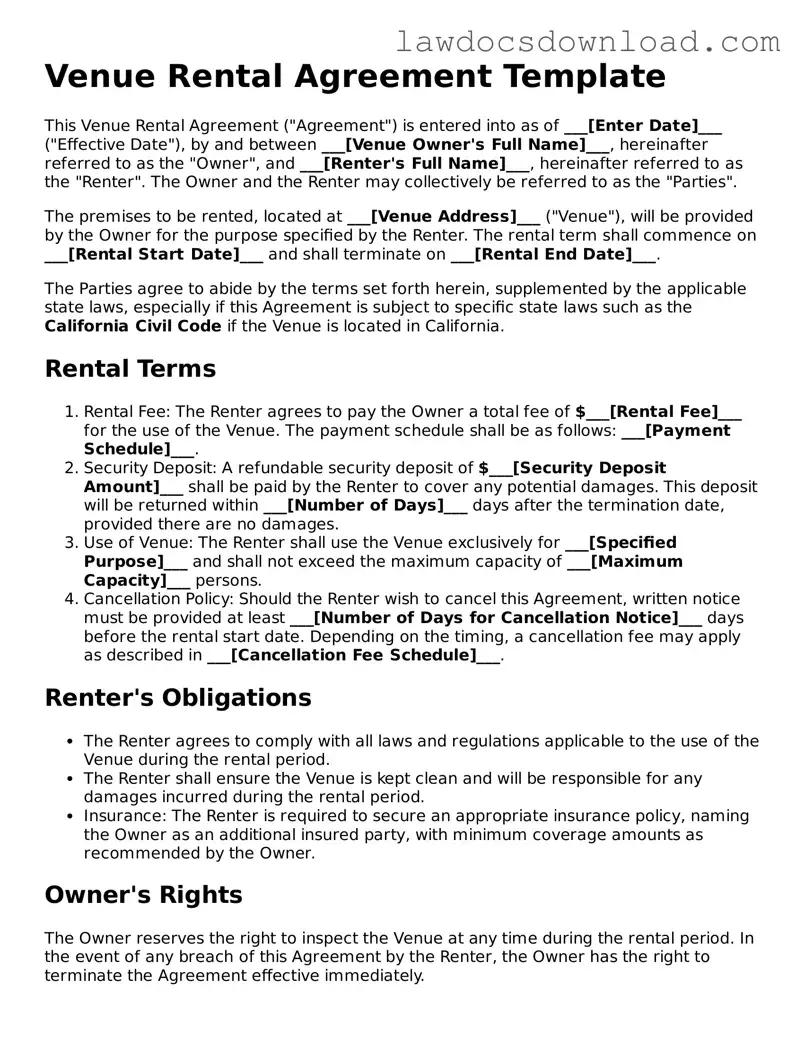Venue Rental Agreement Template
This Venue Rental Agreement ("Agreement") is entered into as of ___[Enter Date]___ ("Effective Date"), by and between ___[Venue Owner's Full Name]___, hereinafter referred to as the "Owner", and ___[Renter's Full Name]___, hereinafter referred to as the "Renter". The Owner and the Renter may collectively be referred to as the "Parties".
The premises to be rented, located at ___[Venue Address]___ ("Venue"), will be provided by the Owner for the purpose specified by the Renter. The rental term shall commence on ___[Rental Start Date]___ and shall terminate on ___[Rental End Date]___.
The Parties agree to abide by the terms set forth herein, supplemented by the applicable state laws, especially if this Agreement is subject to specific state laws such as the California Civil Code if the Venue is located in California.
Rental Terms
- Rental Fee: The Renter agrees to pay the Owner a total fee of $___[Rental Fee]___ for the use of the Venue. The payment schedule shall be as follows: ___[Payment Schedule]___.
- Security Deposit: A refundable security deposit of $___[Security Deposit Amount]___ shall be paid by the Renter to cover any potential damages. This deposit will be returned within ___[Number of Days]___ days after the termination date, provided there are no damages.
- Use of Venue: The Renter shall use the Venue exclusively for ___[Specified Purpose]___ and shall not exceed the maximum capacity of ___[Maximum Capacity]___ persons.
- Cancellation Policy: Should the Renter wish to cancel this Agreement, written notice must be provided at least ___[Number of Days for Cancellation Notice]___ days before the rental start date. Depending on the timing, a cancellation fee may apply as described in ___[Cancellation Fee Schedule]___.
Renter's Obligations
- The Renter agrees to comply with all laws and regulations applicable to the use of the Venue during the rental period.
- The Renter shall ensure the Venue is kept clean and will be responsible for any damages incurred during the rental period.
- Insurance: The Renter is required to secure an appropriate insurance policy, naming the Owner as an additional insured party, with minimum coverage amounts as recommended by the Owner.
Owner's Rights
The Owner reserves the right to inspect the Venue at any time during the rental period. In the event of any breach of this Agreement by the Renter, the Owner has the right to terminate the Agreement effective immediately.
Indemnification
The Renter shall indemnify and hold the Owner harmless from any claims, liabilities, damages, or expenses arising from the Renter's use of the Venue or any breach of this Agreement.
Governing Law
This Agreement shall be governed by and construed in accordance with the laws of the state in which the Venue is located, without giving effect to any principles of conflicts of law.
Signatures
The Parties hereby signify their agreement to the terms outlined in this Venue Rental Agreement as of the Effective Date.
Owner's Signature: __________________________________ Date: _______________
Renter's Signature: __________________________________ Date: _______________

